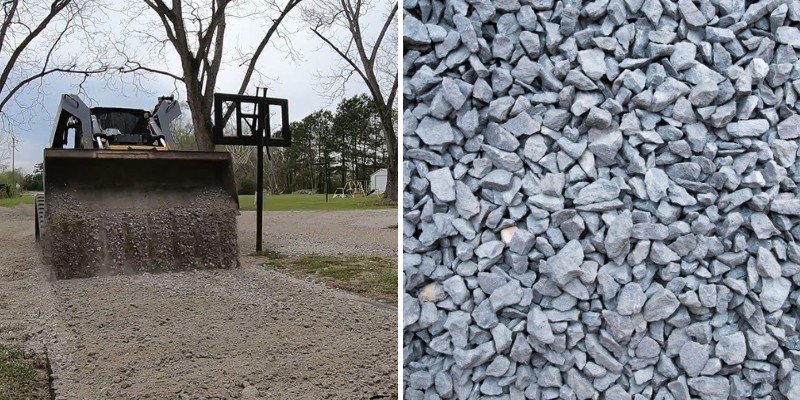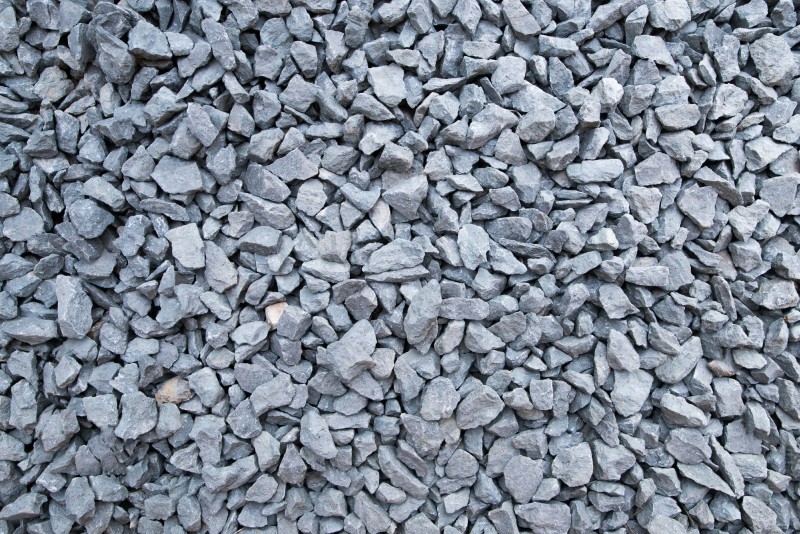According to historians at Monarch Stone International, “The first known use of the word driveway was in 1871”! Surprised? After all, the first car ever built, the Patent Benz Motorwagen,” didn’t go on sale until 17 years later in 1888.

But the promise of automobiles is likely to have established a movement to turn dirt paths into paved surfaces, initially intended for horses and carriages seeking a smoother path to reach homes and estates.
With the introduction of cars, all manner of driveways came into vogue, from semi-circular and curved to straight designs made up of brick, cut stone, clay tile and in some cases, shells.
That stated, gravel still remains the favorite of homeowners seeking to avoid paving or using other surfacing materials.
These days anything goes: Concrete, asphalt, gravel, decomposed granite, brick, natural stone pavers, and cobblestone.
But the material that is currently gaining popularity is crushed concrete. It’s part gravel, part concrete. And all environmentally friendly.
In this article we’ll examine the pros and cons of crushed concrete in driveways and discuss several other aspects of it such as cost and comparison with other material etc.
What is Crushed Concrete?
It’s an answer to the prayers of those who seek every way under the sun to recycle materials that would otherwise wind up in landfills or contributing to blight in urban areas.

Broken concrete that was once used to build structures is removed from sites by contractors and ground into small pieces.
At that point it may be bagged and sold as paving material. In some cases, companies removing the concrete may simply give it away to anyone willing to grind it down themselves.
Pros and Cons of Crushed Concrete
Pros of Crushed Concrete
- -It’s cheaper than concrete and 2- to 3-times cheaper than gravel
- -Recycled concrete may reduce landfill taxes
- -Can also be used for patios and to extend basements
- -Ideal for homeowners seeking green paving alternatives
- -May not cost a penny in some cases
- -Has a relatively long lifespan.
Cons of Crushed Concrete
- -Styles are limiting; most color choices are gray and black
- -Won’t produce a smooth driveway surface under any circumstances
- -It’s not permeable so drainage could be problematic
- -Could detract from the home’s appearance
- -Prices are always in flux due to spotty availability.
What is the Cost of Crushed Concrete?
That depends upon how finely you want your concrete crushed since it’s available in sizes that range from “dust screenings, all the way up to 10 inches in diameter,” according to HomeGuide.
Crushed concrete runs between $11 and $53 dollars per ton which means it is likely to cost you from $16 to $75 per cubic yard (or $1 to $3 per cubic foot).
Prices vary when geographic regions are compared and the type of material that is crushed to produce this type of ground covering also differs dramatically.
For those who stipulate crushed recycled asphalt, expect to spend between $25 and $50 per cubic yard ($10 to $27 per ton; $0.50 to $2 per square foot) if the material was harvested from quarries or contractors.
Small quantities are likely to be pricier and could run up to $72 per ton, which is why you’ll spend less money if you buy larger quantities of this material.
Dramatic price breaks are only found when ordering at least 17.5 tons of crushed material, and the larger to size of the rock pieces, the pricier each lot of crushed concrete is likely to be.
Gravel vs Crushed Concrete for Driveways
If your search for the right driveway material has you confused because gravel and crushed concrete are continually interchanged when describing this material, you’re not alone. But there are differences to consider, starting with the price tag.
Crushed concrete is cheaper and offers benefits like low maintenance, sustainability, and makes a good foundation for heavy vehicles.
You won’t have to put up with weather-related cracking and wear. But it’s not perfect.
While maintenance won’t be a problem, you’ll need to top-off your surface with more crushed concrete down the road because like gravel, this material moves.
Gravel, on the other hand, is also affordable (though not quite as inexpensive as crushed concrete) and no worries about cracks and fading.
Gravel doesn’t require extra drainage to handle run-off that could result from heavy rains and aesthetically, you’ll have more color options.
Yes, you must also top off your driveway with more gravel every few years and because gravel usually consists of smaller pieces, you will have to inspect and rake surrounding areas because gravel can migrate to lawns, get caught in lawn care equipment and even wind up in the soles of shoes.
Different Types of Crushed Concrete
Crushed concrete is sold by grade/type and each one indicates the approximate sizes of the concrete pieces that result from putting slabs of concrete through the crusher.
In general, we have categories such as crushed concrete, crushed stone or crushed asphalt to choose from.
For projects that requires a specific grade, this list of samples can help you choose the right one.
- #6A: Considered the cleanest crushed concrete, this grade is chosen for driveways in muddy areas.
- #10: Referred to as “screenings or dust,” this size is deal for making driveway pavers.
- #21AA Crushed Asphalt: A good choice for driveways because this grade binds together better and prevents dust.
- #21AA Crushed Concrete: Popular in wet areas, this grade is a popular driveway choice and is also very good for drainage.
- #22A: This grade produces a smoother driving surface since particles are so small.
- #57: Considered a specialty crushed stone, pieces are around ¾-inch long and could cost more.
Is Crushed Concrete or Crushed Asphalt a Better Choice?
Contractors posting on the Upgraded Home website say they’re equally good since they both are an amalgam of sand and stone, but adhesives used to make concrete and asphalt produce distinct materials.
Cement is the binder used for concrete. Asphalt requires tar to create paving surfaces.
Both retain these adhesives once they’re put through crushing machines. Here are some facts you should know if you are seeking specific reasons to choose one over the other.
- Pick crushed concrete over asphalt for a more visually pleasing driveway. The use of a tar bonding agent in asphalt pours means that shards tend to be dark gray and black. If you don’t care about aesthetics, asphalt could be your best bet.
- Opt for crushed concrete if your driveway is in an area where hot temperatures are the norm. Crushed asphalt doesn’t do well when exposed to perpetual heat. Crushed asphalt pieces can become gooey and tacky in hot weather, and once things cool down, cracking is probably. Crushed concrete may also crack in frigid temps, and ice-melting salt exacerbates pitting so let weather patterns determine your pick.
- Professionals recommend re-sealing asphalt driveways every three to five years and crushed asphalt installations are no different. You can expect to go for longer periods of re-seal time with crushed concrete, and when it comes to drips, rust and fluids that can infiltrate crushed stone driveways, asphalt hides these better than concrete.
- Crushed concrete driveways tend to last longer than asphalt. On average, pick crushed concrete and your driveway may remain viable for 30 to 40 years. On the other hand, crushed asphalt may only tolerate normal wear and tear for between 20 and 30 years.
- You can expect to pay between 45% and 50% more on crushed concrete products over crushed asphalt products, so always comparison shop before you buy. If you decide to reclaim concrete that is slated for demolition, you could get either type free, but you’re going to have to rent a crusher to pulverize the slabs.
Will Crushed Concrete Harden Over Time?
No matter which type of crushed concrete you choose for your driveway, it will compact over time, albeit not as quickly as gravel due to the sizes of the pieces.
That stated, crushed concrete will not become hard like poured concrete slabs of either type.
Since homeowners choose crushed concretes over other surfacing options, hardening isn’t likely to be important — especially since crushed concrete products are so versatile, environmentally beneficial and affordable, too.
Resources
https://www.motorbiscuit.com/when-was-the-first-car-made-turns-out-the-automobile-is-older-than-the-united-states/
https://www.historiceuropeancobblestone.com/brief-history-of-the-driveway/
https://www.homelogicdriveways.co.uk/crushed-concrete-good-driveways/
https://homeguide.com/costs/gravel-prices
https://www.ramco.us.com/gravel-or-crushed-concrete-for-a-driveway/
https://www.superiorgroundcover.com/crushed-concrete-101/
https://ozinga.com/blog/understanding-crushed-stone-grades/
https://theconstructor.org/concrete/types-concrete-applications/19779/
https://www.bobvila.com/articles/concrete-vs-asphalt-driveways/
https://upgradedhome.com/will-crushed-concrete-harden/
Related Posts
- 12 Different Types of Wood for Outdoor Furniture with Pros/Cons
- How to Stop Sliding Doors from Rattling – Causes and Solutions
- Cheap Ways to Heat a Room – Efficient and Budget-Friendly Solutions
- 11 Ways to Get Rid of Cooking Smells in a Small Apartment or House
- 11 Stores and Sites Like IKEA For Affordable Furniture and Home Products
- All About Polypropylene – Olefin Fabric Sofa Material
Leave a Reply